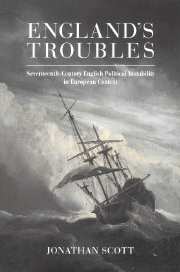Book contents
- Frontmatter
- Contents
- Preface
- Introduction: experience other than our own
- 1 The shape of the seventeenth century
- Part I England's troubles 1618–89: Political instability
- 2 Taking contemporary belief seriously
- 3 The unreformed polity
- 4 Reformation politics (1): 1618–41
- 5 Counter-reformation England
- 6 Reformation politics (2): 1637–60
- 7 Restoration memory
- 8 Restoration crisis 1678–83
- 9 Invasion 1688–9
- Part II The English Revolution 1640–89: Radical Imagination
- Part III Restoration 1660–1702: Reconstruction and Statebuilding
- Sources cited
- Index
2 - Taking contemporary belief seriously
Published online by Cambridge University Press: 04 December 2009
- Frontmatter
- Contents
- Preface
- Introduction: experience other than our own
- 1 The shape of the seventeenth century
- Part I England's troubles 1618–89: Political instability
- 2 Taking contemporary belief seriously
- 3 The unreformed polity
- 4 Reformation politics (1): 1618–41
- 5 Counter-reformation England
- 6 Reformation politics (2): 1637–60
- 7 Restoration memory
- 8 Restoration crisis 1678–83
- 9 Invasion 1688–9
- Part II The English Revolution 1640–89: Radical Imagination
- Part III Restoration 1660–1702: Reconstruction and Statebuilding
- Sources cited
- Index
Summary
Things that love night,
Love not such nights as these: The wrathful skies
Gallow the very wanderers of the darke
And make them keep their Caves: since I was a man
Such sheets of Fire, such bursts of horrid Thunder,
Such groanes of roaring Winde, and Raine, I never
Remember to have heard. Man's Nature cannot carry
Th'affliction, nor the feare.
William Shakespeare, King Lear, Act III, scene ii, ll. 38–45INTRODUCTION: BEHIND THE VEIL OF RESTORATION
To recover England's troubles it is necessary to re-enter an alien mental world. In this respect, as Robert Darnton reminds us: ‘the most promising moment in research can be the most puzzling. When we run into something that seems unthinkable to us, we may have hit upon a valid point of entry into an alien mentality.’ Our present distance from the perceptions and fears that underlay the troubles is more than simply the effect of the intervening three hundred years. It is politically created: the first and final imperative of restoration was forgetting.
The signs of this are everywhere. They are visible, not least, in English incomprehension in the face of the attitudes sustaining the last theatre of the troubles. That Northern Ireland's conflict has its origins in the seventeenth century is well enough understood. What is less frequently pointed out is that in the seventeenth century those troubles were English. It is then that we find the perceptions and language of that anti-hero Ian Paisley (a protestant enclave under encirclement, ‘popery’ whooping around the outside) in the mouths of England's heroes: John Pym, Oliver Cromwell, John Milton, the Earl of Shaftesbury, the Prince of Orange.
- Type
- Chapter
- Information
- England's TroublesSeventeenth-Century English Political Instability in European Context, pp. 43 - 65Publisher: Cambridge University PressPrint publication year: 2000



